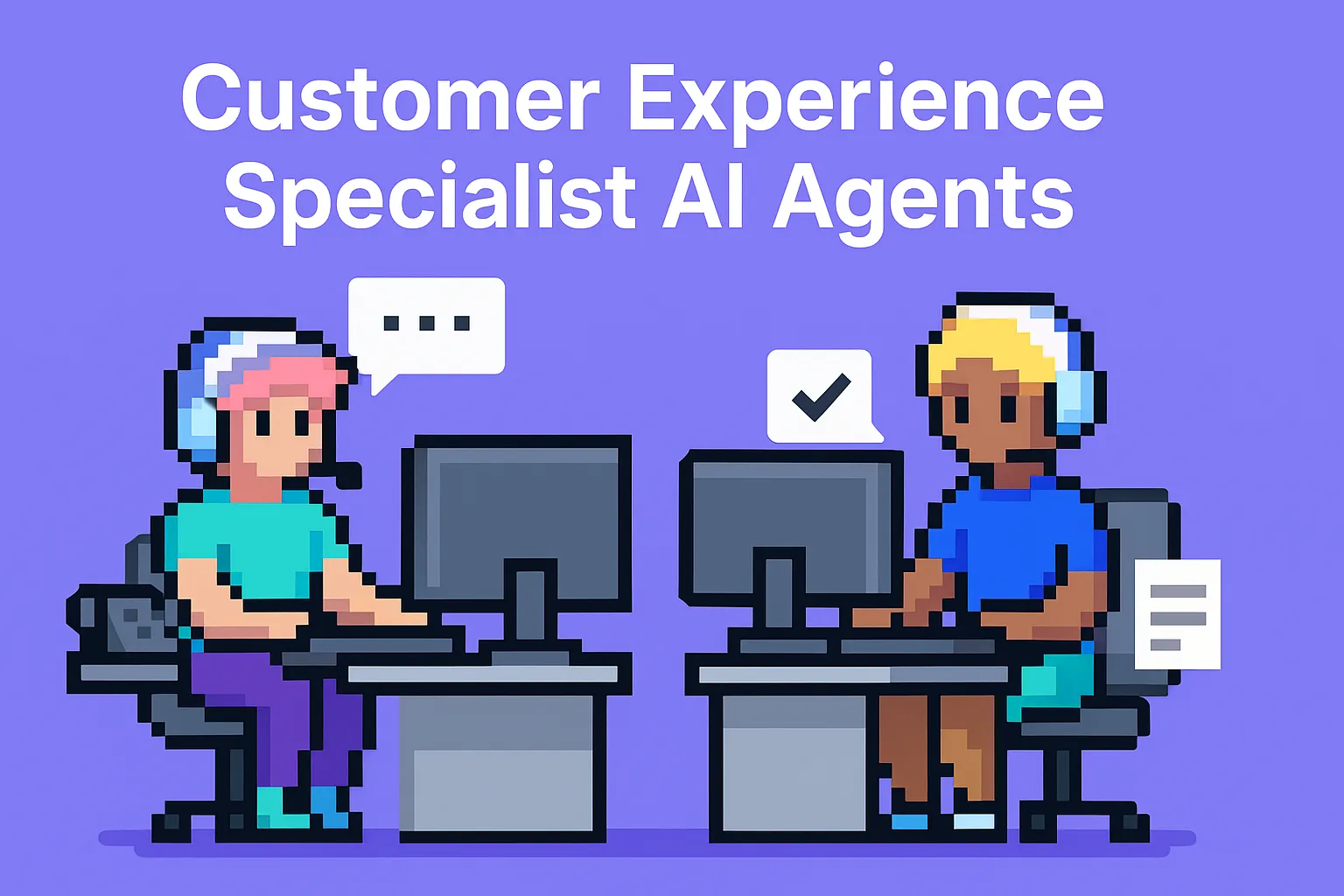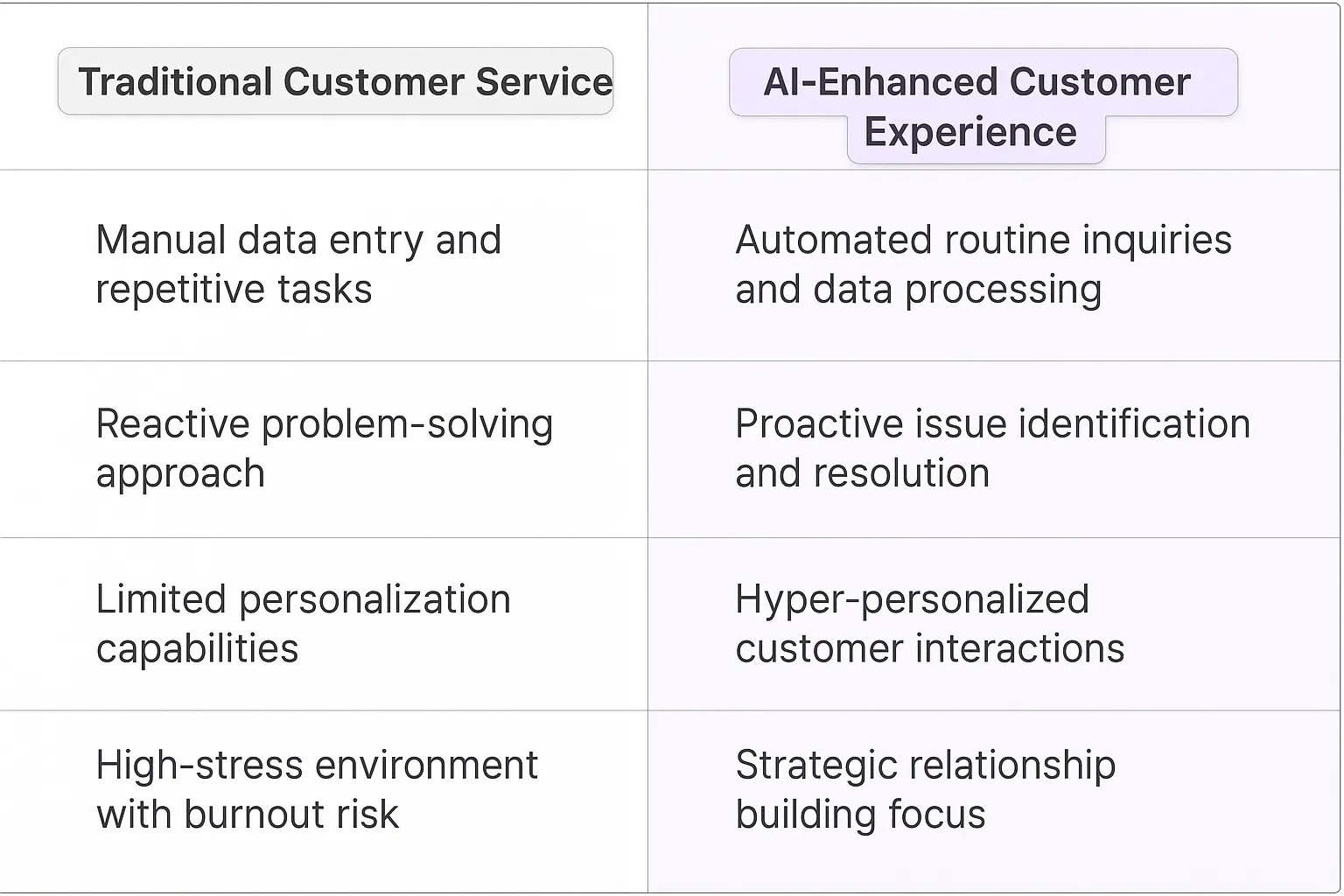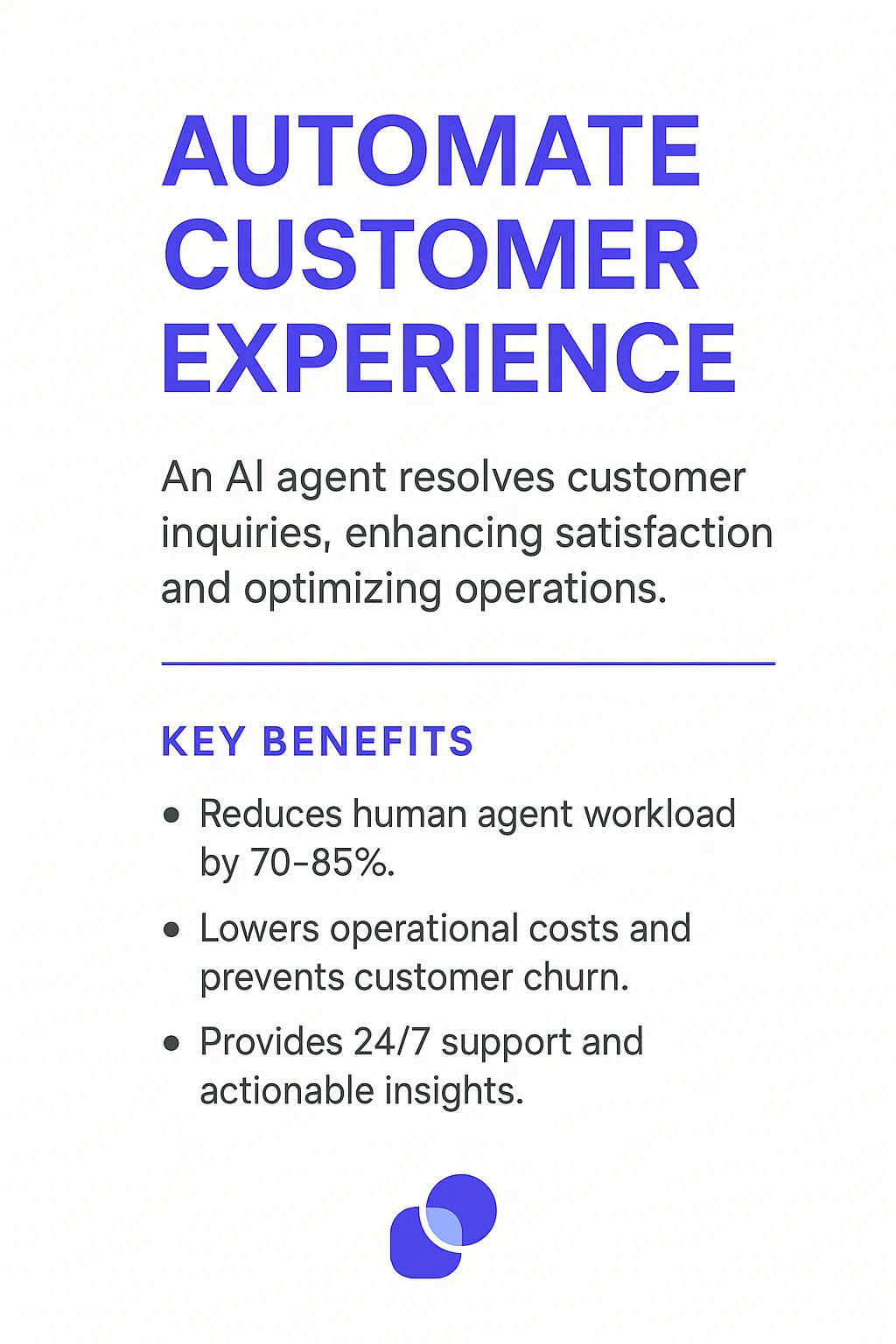A Customer Experience Specialist AI Agent is a sophisticated digital tool that uses artificial intelligence to enhance and streamline customer interactions. It's not just a chatbot or a simple automated response system. These AI agents are designed to understand context, learn from interactions, and provide personalized solutions. They act as a bridge between customers and businesses, handling everything from routine inquiries to complex problem-solving, all while continuously improving their performance.
The key features that set these AI agents apart include:
These features combine to create a powerful tool that's transforming the landscape of customer experience.

Before AI agents entered the scene, customer experience specialists were like lone wolves in a vast digital wilderness. They relied on a mishmash of tools: clunky CRM systems, static knowledge bases, and endless spreadsheets. It was a world of manual data entry, repetitive tasks, and the constant struggle to keep up with an ever-growing queue of customer inquiries.
The typical day involved juggling multiple chat windows, frantically searching for information, and often providing delayed or inconsistent responses. It was a high-stress environment where burnout was common, and delivering a truly personalized customer experience felt like a pipe dream.
Enter AI agents – the game-changers that are redefining what's possible in customer experience. These digital teammates are like having a squad of brilliant interns who never sleep, never complain, and continuously improve.
First off, AI agents are crushing it when it comes to handling routine inquiries. They're freeing up human specialists to focus on complex issues that require empathy and creative problem-solving. This isn't just about efficiency; it's about elevating the role of customer experience specialists from information retrievers to strategic relationship builders.
But here's where it gets really interesting: AI agents are becoming the ultimate knowledge aggregators. They're not just pulling information from static databases; they're synthesizing data from across the organization in real-time. This means customer experience specialists can tap into a constantly evolving knowledge base that's always up-to-date and contextually relevant.
The personalization potential is off the charts. AI agents can analyze customer history, preferences, and behavior patterns to provide tailored recommendations and solutions. It's like having a psychic assistant who knows exactly what the customer needs before they even ask.
Let's talk about scalability. With AI agents, companies can handle massive spikes in customer inquiries without breaking a sweat. This elasticity is a game-changer for businesses dealing with seasonal fluctuations or unexpected surges in demand.
Perhaps the most exciting benefit is the continuous learning loop. AI agents are constantly improving based on interactions and feedback. They're identifying trends, spotting potential issues before they become problems, and providing invaluable insights to improve products and services.
For customer experience specialists, this means having a powerful ally that enhances their capabilities, allows them to make data scientist-driven decisions, and ultimately deliver experiences that wow customers. It's not about replacing human touch; it's about amplifying it to create moments of delight at scale.
In essence, AI agents are transforming customer experience specialists from reactive problem-solvers to proactive experience designers. They're not just tools; they're catalysts for a fundamental shift in how businesses connect with their customers. And we're just scratching the surface of what's possible.

Customer experience is the new battleground for businesses, and AI agents are the secret weapons. These digital teammates can transform how we approach customer satisfaction, turning what was once a reactive game into a proactive strategy.
Let's dive into some key processes where AI agents can make a real difference:
Now, let's break it down to the nitty-gritty. Here are some specific tasks where AI agents can be game-changers for CX specialists:
The integration of AI agents into customer experience isn't about replacing human specialists. It's about augmenting their capabilities, allowing them to focus on what humans do best: building genuine connections and solving complex, nuanced problems. As these AI agents evolve, we're going to see a new breed of CX specialists emerge - ones who are part data scientist, part empath, and fully equipped to deliver experiences that don't just satisfy customers, but delight them.
The companies that recognize this shift and embrace it early will be the ones writing the playbook for customer experience in the AI age. It's not just about keeping up; it's about setting the pace. And for CX specialists willing to dance with these AI partners, the music is just beginning.

The versatility of AI agents in Customer Experience Specialist roles makes them valuable across various industries. Let's dive into some meaty, industry-specific use cases that showcase how AI can transform workflows and processes in ways that might not be immediately obvious.
These digital teammates aren't just glorified chatbots. They're sophisticated problem-solvers that can handle complex customer interactions, predict needs, and even influence business strategy. Think of them as your company's secret weapon in the never-ending battle for customer loyalty.
From retail to healthcare, finance to hospitality, these AI agents are rewriting the rules of customer engagement. They're not replacing humans; they're amplifying human capabilities, allowing your team to focus on high-value interactions while the AI handles the heavy lifting of data analysis and routine inquiries.
But here's the kicker: the real power of these AI agents lies in their ability to learn and adapt. They're constantly evolving, getting smarter with each interaction, and uncovering insights that can drive business growth. It's like having a tireless, ever-improving customer experience expert working 24/7.
So, let's explore how these digital dynamos are shaking things up across different sectors. You might be surprised at the innovative ways companies are leveraging AI to create customer experiences that are not just satisfactory, but truly exceptional.
The retail industry is ripe for disruption, and Customer Experience Specialist AI Agents are leading the charge. These digital teammates are transforming how brands interact with shoppers, creating personalized experiences that feel both high-tech and high-touch.
Take Zara, the fast-fashion giant. They've deployed AI agents across their digital platforms to serve as personal stylists for every customer. These agents analyze past purchases, browsing history, and even social media activity to curate individualized lookbooks and product recommendations.
But here's where it gets interesting: these AI stylists don't just push products. They're programmed to understand and adapt to each customer's unique style evolution. If a shopper's tastes shift from bohemian to minimalist, the AI picks up on these subtle cues and adjusts its recommendations accordingly.
The result? A dramatic uptick in customer satisfaction and loyalty. Zara reports a 30% increase in repeat purchases and a 25% boost in average order value since implementing these AI stylists.
What's more, these digital teammates are learning and improving with every interaction. They're identifying trends before they hit the mainstream, giving Zara's design team invaluable insights into what customers want before they even know they want it.
This isn't just about selling more clothes. It's about creating a shopping experience that feels tailored and intuitive, bridging the gap between e-commerce convenience and the personalized touch of in-store shopping.
The implications are massive. As these AI agents become more sophisticated, we could see a future where every brand interaction feels like a conversation with your most stylish friend - one who happens to have perfect recall of your entire fashion history and an uncanny ability to predict what you'll love next.
This is just the beginning. The retail industry is setting the stage for a new era of customer experience, where AI agents aren't just tools, but integral members of the brand-customer relationship. And if history is any indicator, where retail goes, other industries will follow.
The hospitality industry is undergoing a seismic shift, and AI-powered Customer Experience Specialist agents are at the epicenter. These digital teammates are redefining what it means to provide exceptional service in hotels and resorts worldwide.
Let's zoom in on the Ritz-Carlton's latest innovation. They've rolled out AI concierges that are so sophisticated, guests often can't tell they're not human. These AI agents are fluent in over 100 languages, have encyclopedic knowledge of local attractions, and can anticipate guest needs with uncanny accuracy.
What sets these AI concierges apart is their ability to learn and adapt in real-time. They're not just pulling from a static database of information. Instead, they're constantly updating their knowledge based on guest interactions, local events, and even weather patterns.
For example, if a guest mentions they're a vegan food enthusiast, the AI doesn't just spit out a list of nearby vegan restaurants. It curates a personalized culinary journey, factoring in the guest's preferences, dietary restrictions, and even their mood. It might suggest a hidden gem of a vegan sushi place for dinner, followed by a late-night vegan ice cream spot that just opened last week.
The impact on guest satisfaction is profound. The Ritz-Carlton reports a 40% increase in positive reviews mentioning concierge services since implementing these AI agents. More importantly, they're seeing a 35% uptick in guest loyalty program sign-ups.
But here's where it gets really interesting: these AI concierges are becoming a goldmine of customer insights. They're identifying patterns in guest behavior and preferences that human staff might miss. This data is helping the Ritz-Carlton tailor their services at a macro level, from room designs to menu offerings.
We're witnessing the birth of hyper-personalized hospitality. These AI agents are bridging the gap between the efficiency of technology and the warmth of human interaction. They're not replacing human staff; they're augmenting them, allowing human employees to focus on high-touch, complex guest interactions.
The ripple effects of this innovation will be felt far beyond the hospitality industry. As consumers get used to this level of personalized service in hotels, they'll start expecting it everywhere. We're looking at a future where every service interaction, from banking to education, could be tailored to our individual needs and preferences.
This isn't just about making hotel stays more comfortable. It's about fundamentally changing how we interact with businesses and services. The hospitality industry is writing the playbook for AI-enhanced customer experiences, and the rest of the world is taking notes.
Implementing a Customer Experience Specialist AI Agent isn't just about plugging in some fancy algorithm and watching the magic happen. It's a complex dance of data, infrastructure, and user expectations.
First off, you're dealing with a massive amount of unstructured data. Customer interactions come in all shapes and sizes - emails, chat logs, social media posts, voice recordings. Your AI needs to make sense of this babel tower of communication. It's like trying to understand a conversation where everyone's speaking a different language, using different slang, and referencing different cultural touchpoints.
Then there's the real-time processing challenge. Customers expect instant responses. Your AI can't take a coffee break to ponder the nuances of a query. It needs to analyze, contextualize, and respond faster than a New York minute. This requires some serious computational muscle and clever architecture.
Let's not forget about integration. Your AI agent needs to play nice with your existing CRM, ticketing system, knowledge base, and probably a dozen other tools. It's like introducing a new player to a well-established team mid-season. The potential for dropped balls and miscommunication is high.
On the operational side, things get even trickier. You're essentially asking your AI to be the face of your company. It's not just about answering questions; it's about embodying your brand voice, understanding context, and knowing when to escalate to a human.
Training this AI is a Herculean task. You need to feed it a diet of high-quality, diverse data that covers the full spectrum of customer interactions. But here's the kicker - this data needs to be constantly updated. Customer needs evolve, products change, new issues arise. Your AI needs to keep up or risk becoming as useful as last year's smartphone.
Then there's the human factor. How do you manage the transition for your existing customer service team? Some will embrace the AI as a digital teammate, others might see it as a threat. You need a change management strategy that's part diplomacy, part training program, and part cheerleading.
Privacy and security can't be an afterthought. Your AI is handling sensitive customer data. One slip-up, one data leak, and you're not just facing angry customers, you're staring down the barrel of regulatory nightmares and potential lawsuits.
Lastly, there's the challenge of setting realistic expectations. Both internally and with customers. Your AI isn't a magic wand that will solve all customer service woes overnight. It's a powerful tool, but one that needs time to learn, adapt, and improve. Managing these expectations is crucial to avoid disappointment and maintain trust in the long run.
Customer Experience Specialist AI Agents are more than just a technological advancement; they're a paradigm shift in how businesses approach customer interactions. By augmenting human capabilities with AI-powered insights and automation, these digital teammates are enabling companies to deliver personalized, efficient, and proactive customer experiences at scale.
The impact of these AI agents extends far beyond just improving response times or reducing workload. They're fundamentally changing the role of customer experience specialists, elevating them from reactive problem-solvers to strategic experience designers. This shift is creating new opportunities for businesses to differentiate themselves through superior customer service.
However, the journey to successfully implementing these AI agents is not without challenges. From technical hurdles like data integration and real-time processing to operational concerns around training and change management, businesses must navigate a complex landscape to fully realize the potential of these tools.
Despite these challenges, the potential rewards are immense. As we've seen in industries from retail to hospitality, Customer Experience Specialist AI Agents are setting new standards for personalized service and driving significant improvements in customer satisfaction and loyalty.
As these AI agents continue to evolve, we can expect to see even more innovative applications and deeper integration into business processes. The future of customer experience is here, and it's powered by AI. Companies that embrace this technology and successfully navigate its implementation will be well-positioned to thrive in an increasingly competitive and customer-centric business landscape.